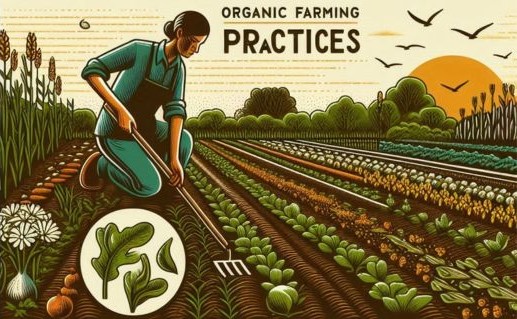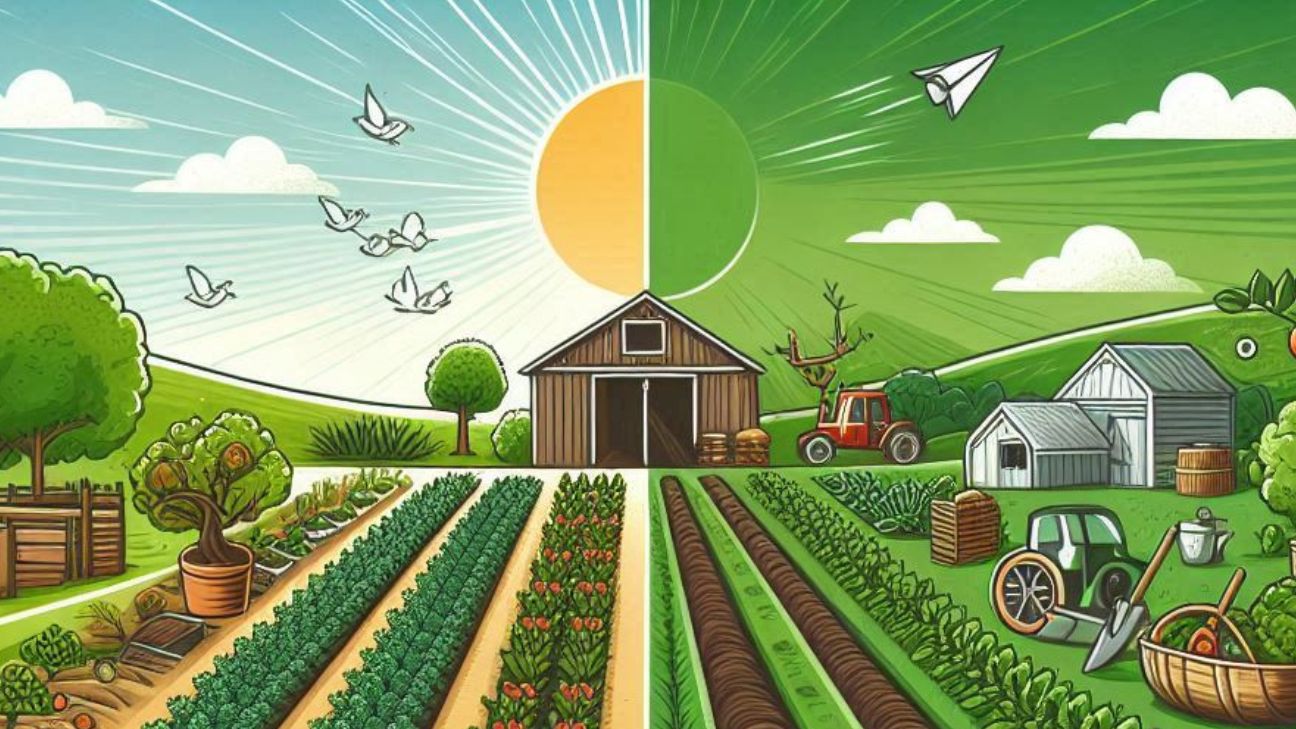In the world of sustainable practices, the terms “organic farming” and “organic agriculture” are often used interchangeably. However, while they share common goals of promoting environmental health, food safety, and social responsibility, they encompass different scopes and philosophies.
Understanding these distinctions is crucial for farmers, consumers, and policymakers alike as we strive to create a more sustainable and healthy food system. To get a broader perspective, it’s also important to understand the various types of farming in India, which cater to different climatic conditions, crop patterns, and agricultural practices.
What is Organic Agriculture?
Organic agriculture is a holistic farming system that emphasizes ecological balance, biodiversity, and soil health. It goes beyond the mere avoidance of synthetic chemicals, focusing on sustainable practices that protect natural resources and promote the well-being of all living organisms.
This approach integrates traditional knowledge with modern science to create farming systems that are environmentally, socially, and economically sustainable.
Principles
The core principles of organic agriculture include:
- Biodiversity: Encouraging a wide range of species in farming systems to enhance ecosystem resilience and productivity.
- Soil Health: Maintaining and improving soil fertility through natural processes, such as composting, crop rotation, and the use of cover crops.
- Animal Welfare: Ensuring that animals are treated with respect and care, providing them with natural living conditions, and avoiding the use of hormones or antibiotics.
- Ecological Balance: Creating farming systems that mimic natural ecosystems, reducing the need for external inputs, and enhancing the farm’s sustainability.
What is Organic Farming?
Organic farming refers specifically to the methods used in cultivating crops and raising livestock following organic standards. The primary focus is on avoiding synthetic inputs like pesticides, fertilizers, and genetically modified organisms (GMOs).
Instead, organic farmers use natural methods to enhance soil fertility, control pests, and maintain healthy crops and animals.
Core Practices

Some of the key practices in organic farming include:
- Crop Rotation: Growing different types of crops in succession on the same land to maintain soil health and reduce pest and disease outbreaks.
- Composting: Recycling organic matter to create nutrient-rich compost that enriches the soil.
- Biological Pest Control: Using natural predators and beneficial insects to manage pest populations, reducing the need for chemical pesticides.
Differences Between Organic Farming and Organic Agriculture
While organic farming is primarily concerned with the methods of producing food, organic agriculture encompasses a broader scope. Organic agriculture includes not only farming techniques but also the entire system of food production, distribution, and consumption. It involves considerations of market systems, community health, and the social and ethical aspects of food production.
Philosophical and Practical Differences
The philosophical difference lies in the fact that organic agriculture is a comprehensive approach to farming that includes social and economic dimensions, whereas organic farming focuses specifically on production methods.
Practically, organic agriculture might involve community-supported agriculture (CSA) models, farmer cooperatives, and efforts to create equitable food systems, whereas organic farming is more about what happens on the farm itself.
How to Make an Agriculture and Organic Farming Model?
Creating a sustainable model that combines the principles of organic farming with the broader approach of organic agriculture requires careful planning and a deep understanding of both practices. The framework should be built on the principles of sustainability, community involvement, and continuous improvement.
Steps to Develop the Model
- Planning: Start with a comprehensive plan that outlines your goals, resources, and the specific practices you will implement.
- Resource Management: Efficiently manage natural resources like water, soil, and biodiversity to ensure long-term sustainability.
- Community Involvement: Engage with local communities to build support, share knowledge, and create a market for organic products.
- Continuous Evaluation: Regularly assess the effectiveness of your practices and make adjustments as needed to improve sustainability and productivity.
How to Do Organic Agriculture?
Transitioning from conventional to organic agriculture involves several key steps:
- Land Preparation: Begin by eliminating synthetic chemicals and transitioning to organic inputs. This may involve a period of soil rehabilitation to restore its natural fertility.
- Seed Selection: Choose organic, non-GMO seeds that are well-suited to your local environment and resistant to pests and diseases.
- Crop Management: Implement organic practices like crop rotation, intercropping, and the use of cover crops to enhance soil health and reduce pest pressure.
Maintaining Organic Certification
To maintain organic certification, farmers must adhere to strict guidelines set by certification bodies. This includes keeping detailed records of farming practices, avoiding prohibited substances, and undergoing regular inspections.
Challenges and Solutions
Common challenges in organic agriculture include pest management, weed control, and maintaining soil fertility. Solutions often involve adopting innovative practices like permaculture, agroforestry, and integrating livestock into cropping systems to create a more resilient and self-sustaining farm.
What is the Food and Agriculture Organization (FAO)?
The Food and Agriculture Organization (FAO) is a specialized agency of the United Nations that leads international efforts to defeat hunger and improve nutrition and food security.
Established in 1945, FAO works in over 130 countries to promote sustainable agriculture, improve rural livelihoods, and ensure that all people have access to sufficient, safe, and nutritious food.
Role in Global Agriculture
FAO plays a crucial role in setting international standards for agriculture, providing technical assistance to member countries, and conducting research on sustainable agricultural practices. The organization also works to address global challenges like climate change, biodiversity loss, and food insecurity.
What Does the Food and Agriculture Organization (FAO) Do?
FAO implements a wide range of programs aimed at promoting sustainable agriculture, including:
- The International Code of Conduct on Pesticide Management: A voluntary framework that guides the development of national policies and regulations for pesticide use, promoting safer and more sustainable practices.
- The Global Soil Partnership: An initiative that aims to improve soil management practices worldwide, recognizing the vital role of healthy soils in food security and ecosystem health.
- The Organic Agriculture Programme: FAO supports organic farming through research, policy advice, and capacity building, helping countries develop their organic agriculture sectors.
Impact
FAO’s work has had a significant impact on the global adoption of organic farming and agriculture. By promoting sustainable practices, providing technical assistance, and facilitating knowledge exchange, FAO helps countries transition to more sustainable food systems that prioritize health, biodiversity, and social equity.
In conclusion, while organic farming and organic agriculture share common goals, they differ in scope and philosophy. Organic farming focuses on the specific practices used in growing crops and raising livestock, while organic agriculture takes a broader approach, incorporating social, economic, and environmental considerations.
As we increasingly turn to sustainable practices to address global challenges, understanding these distinctions is essential for creating resilient and equitable food systems.
Being consumers and producers, we all have a role to play in promoting sustainable agriculture. Whether you’re a farmer considering a transition to organic practices or a consumer looking to make more informed choices, supporting organic farming and agriculture can make a significant difference in our daily lifestyle.

